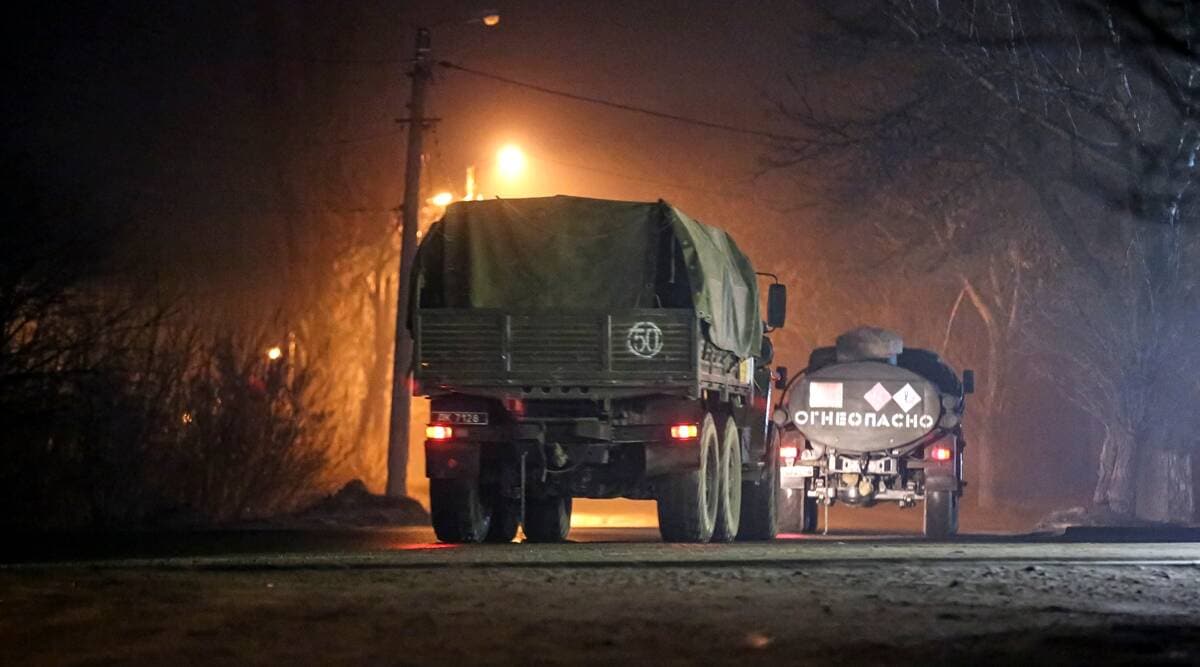 Military trucks move down a street outside Donetsk, the territory controlled by pro-Russian militants in eastern Ukraine, late Tuesday. (Photo: AP)
Military trucks move down a street outside Donetsk, the territory controlled by pro-Russian militants in eastern Ukraine, late Tuesday. (Photo: AP) As the United Nations Security Council is expected to take up a draft resolution condemning Russian invasion in the early hours of Saturday, India is caught in a diplomatic bind between the Western powers, led by the US, and its strategic imperatives vis a vis Russia.
External Affairs Minister S Jaishankar late Thursday night had telephonic conversations with his Russian counterpart Sergey Lavrov and US Secretary of State Antony Blinken, insisting that dialogue and diplomacy are the best way forward to defuse the Ukraine crisis. As Russian troops reached the gates of Kyiv, Ukrainian Foreign Minister Dmytro Kuleba called Jaishankar and shared his “assessment” of the situation.
On Friday, Ambassadors of European countries in India got together in New Delhi and expressed solidarity with their Ukrainian counterpart and strongly condemned Russia’s “unprovoked and unjustified” military attack on Ukraine. Ambassador of the European Union to India and Bhutan Ugo Astuto said the EU and its member states stand in solidarity with Ukrainian Ambassador to India Igor Polikha.
Speaking to The Indian Express Thursday, Polikha said Kyiv is “deeply dissatisfied” with India’s position. “I don’t know how many world leaders (Vladimir) Putin would listen to but the status of (Prime Minister Narendra) Modiji makes me hoipeful.”
All this has added to New Delhi’s diplomatic challenge. More so given the wording of the UN draft resolution moved by the US and Albania.
According to a US State Department official in Washington DC, the resolution condemns, in the strongest terms possible, “Russia’s aggression, invasion, and violation of Ukraine’s sovereignty. It reaffirms the sovereignty, independence, unity, and territorial integrity of Ukraine. And it requires the Russian Federation immediately, completely, and unconditionally to withdraw its forces.”
This formulation has pushed New Delhi into a diplomatic corner a day after Prime Minister Narendra Modi, in his call to Russian President Vladimir Putin, appealed for “an immediate cessation of violence”, but avoided echoing the chorus of Western outrage.
US President Joe Biden said that his administration is in “consultations with India”, but that “hasn’t been resolved yet” – signalling the gulf between New Delhi and Washington on the issue.
Biden also said: “Putin will be a pariah on the international stage. Any nation that approves of Russia’s open aggression against Ukraine will be tainted by association.”
While Russia, which holds the Presidency of the UN Security Council for the month of February, will preside over it, and is certain to veto the resolution, it will test India’s position: which side of the divide will it take — or will it abstain like the last time.
On January 31, India had abstained on a procedural vote on whether to discuss the issue of Ukraine. India had then articulated its position on “legitimate security interests” that echoed with a nuanced tilt towards the Russian position, and had abstained along with Kenya and Gabon.
This statement was made at the UNSC meeting on Ukraine, where Russia and China tried to block discussions while 10 UNSC members — including US, UK and France — voted in favour of the discussion. The UNSC had gone ahead with the discussions, as 10 countries — it needed 9 yes votes — voted in favour of the discussions.
But this time, it is not just about a procedural vote, it’s on a more substantive issue on which strong words of condemnation – “blood on (Putin’s) hands – have been said.
When asked about India, Brazil and UAE not condemning Russia’s actions, the US official said, “There’s now a resolution that is being put on the table, and I think every member of the Council is going to have to decide where they stand. As (US ambassador to the UN) Ambassador Linda Thomas-Greenfield has been saying, this is not the time to sit on the fence. And I think we’ll see over the coming days where members of the Council are on this fundamental question about sovereignty and territorial integrity, and I think you’ll see Russia isolated and held accountable before the rest of the world in the Security Council.”
Sources said this was the moot point of the calls between Blinken and Jaishankar. According to the US State Department, Blinken spoke with Jaishankar to discuss Russia’s “premeditated, unprovoked, and unjustified” attack on Ukraine and “stressed the importance of a strong collective response to condemn Russia’s invasion and call for an immediate withdrawal and ceasefire”.
In his talks with Lavrov, Jaishankar conveyed to him that “dialogue and diplomacy” are the best way forward to defuse the crisis.
- The Indian Express website has been rated GREEN for its credibility and trustworthiness by Newsguard, a global service that rates news sources for their journalistic standards.


